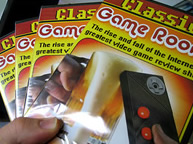After taking a look at the Classic Game Room DVD and the show’s overall place as a pioneer in Internet video, I got a chance to chat with co-creator Mark Bussler himself. To those who may be unfamiliar with his work, Mark Bussler is a producer and director of high definition feature documentaries for DVD, HDTV and television. Bussler’s high-quality visuals and audio work have gone on to earn him hundreds of positive reviews nationwide and have set his documentaries apart from the average fare.
 Since the demise of Classic Game Room, Mr. Bussler has gone on to successfully direct a number of historical documentaries. Bussler’s portfolio includes films narrated by Gene Wilder, Richard Dreyfuss, Keith Carradine, Ronald F. Maxwell and David Carradine. While he began with a budget of less than $1,000 for his first film, Bussler now manages the production of feature length documentary films with budgets in excess of $350,000. Five of his documentaries now air on public television. Bussler’s next project is a feature-length high-definition film entitled Westinghouse, which focuses on George Westinghouse, his achievements, companies and his battle with Thomas Edison.
Since the demise of Classic Game Room, Mr. Bussler has gone on to successfully direct a number of historical documentaries. Bussler’s portfolio includes films narrated by Gene Wilder, Richard Dreyfuss, Keith Carradine, Ronald F. Maxwell and David Carradine. While he began with a budget of less than $1,000 for his first film, Bussler now manages the production of feature length documentary films with budgets in excess of $350,000. Five of his documentaries now air on public television. Bussler’s next project is a feature-length high-definition film entitled Westinghouse, which focuses on George Westinghouse, his achievements, companies and his battle with Thomas Edison.
It was my pleasure to go into detail with him about how each episode was created, why he loved retro gaming so much, and whether or not Classic Game Room would be successful in a YouTube-changed world.
Sega-16: How did the idea for Classic Game Room come about? In the commentary for the DVD you state that it was the show’s belief that older games could be just as fun if not more so than modern games. Was the show always planned to center on retro games?
Mark Bussler: In the beginning in 1999 the whole concept of doing a video game review “show” on the Internet was brand new. We originally planned to do the newest video games on the market, which were for the PS1 and Dreamcast at the time. After one or two episodes we started doing these segments on “The Classic Game of the Week”. During the short clip of Dig Dug in the film you can hear Dave introducing it. That was a hit and most people who were watching the show just loved it and we made more. We thought it was a great idea because both of us had grown up playing video games and had quite a collection of old-school games.
Sega-16: Could you explain the process for creating one episode? Were you given full creative control from fromUSAlive.com?
Mark Bussler: Broadcasting yourself online and making a funny show was not a common thing in 1999, not like it is today. FromUSAlive.com was a startup company and needed content fast. We were directors for other shows on the network but of course wanted to make our OWN show! We were fortunate to have full creative control from the beginning and took advantage of it. Both of us were huge film buffs, in fact we were in film school at the time in the evenings. We started off reviewing games on camera. Our back and forth bantering got smoother as the show progressed. Dave is hilarious and we just came up with stuff on the fly. Later on in the series we were planning out these short movie-like sequences like the X-Men spoof and race scene in the Sega GT episode; none of it was scripted. I don’t think we could have scripted it, we’d have thought too much about it!
Sega-16: Did the $50 budget ever limit the shows potential? The story sequences seemed to get more and more complex. My favorite was the “Real World” parody. Was there ever anything you couldn’t do?
Mark Bussler: The Real World parody called The Real Game Room was about the most complex review that we did. That took us an entire Saturday to shoot. The budget did limit the show’s potential, but on the other hand it was that struggle to make a show on a $50 budget that also made it great. I think that when working on tight budgets you are forced to become more creative. We also used the “low budget” nature of the show as a humorous gag in itself, as evidenced by the ridiculous green screens, the toys that we lit on fire and the disco ball of malt liquor power that predicted the future. Now on the flip side was the time that it took to create a great show, which is eventually what ended us. If a truly great episode took an entire day of studio equipment to shoot that was a day we weren’t getting our other work done. And in mid-2000 when we were struggling to stay afloat as it was, that was tough to do. Dave and I are both perfectionists so we’d work as long as we had to in order to finish the Game Room review right. That was a day we weren’t getting our other work done on our other programs. Keep in mind we were directing and editing about thirty different Internet TV shows a week, although most were much smaller in scope.
Sega-16: How did you decide which games to review?
Mark Bussler: It was a complex mathematical formula. “Dude, I love Frogger. Let’s do that!” We’d also do the newest games on the market because those were our biggest, most popular reviews. Like SeaMan!
Sega-16: I knew it had to be some kind of formula! In the X-Men episode, you and David praise the Genesis as the “pinnacle” of gaming and promise future reviews of classics like Phantasy Star 2 and Shinobi. Why did the idea of reviewing many of these classics ultimately not come to fruition?
Mark Bussler: We were cancelled before we fulfilled our destiny I’m afraid. Or shut down, whatever you want to call it. In the pursuit of trying to get more viewers we were primarily reviewing new games, which was a lot of fun. But in the end we did not get to concentrate on the Genesis as much as we wanted to. If I remember correctly we were waiting for the right time to do them right. We’d even shot some scenes for Herzog Zwei and had footage of Thunder Force III recorded…. but alas, it was not meant to be. The Genesis was our favorite system with some of the best games ever made. I still have mine and it works great.
Sega-16: …Which perfectly leads to the question of all questions: What was your favorite Genesis game?
 Mark Bussler: Herzog Zwei. What a brilliant game. I see that Sega-16 gives it high marks as well. It was just so darned original. The whole concept of a military strategy game with a transforming Mecha running around wreaking havoc is awesome. It came out in 1989 and I’ve never seen another game like it. The music is great too, and I love the sound when the little troops get blown up by a tank. You know that “sploot!” sound? Fantastic. In more recent years I’ve gotten back into shooters like M.U.S.H.A and Thunder Force, they’re fun to play when you only have twenty minutes here or there to play a game.
Mark Bussler: Herzog Zwei. What a brilliant game. I see that Sega-16 gives it high marks as well. It was just so darned original. The whole concept of a military strategy game with a transforming Mecha running around wreaking havoc is awesome. It came out in 1989 and I’ve never seen another game like it. The music is great too, and I love the sound when the little troops get blown up by a tank. You know that “sploot!” sound? Fantastic. In more recent years I’ve gotten back into shooters like M.U.S.H.A and Thunder Force, they’re fun to play when you only have twenty minutes here or there to play a game.
Sega-16: Good answer! You said that Classic Game Room built up a cult following, did you receive your fair share of love and hate mail? Were there any rabid Genesis fans demanding more reviews?
Mark Bussler: We seemed to have a cult following and received a lot of emails at the time. Most of them were game enthusiasts who really enjoyed the show and our style of humor. Most of the hate mail was silly and misspelled. We didn’t get that much of it though, who doesn’t like video games and beer? Seriously. It’s a winning combination. What is really surprising is that we are still receiving fan emails seven years after the show was cancelled. I don’t recall the Genesis having as much support in ’99 and 2000, not like it does now. It was still the recently retired system back then for a lot of people. People have dubbed it “retro” now that it’s nearly twenty years old, and thanks to websites like yours, it is getting the respect it deserves.
Sega-16: Today, video content on the Internet has exploded thanks to sites like YouTube. Do you think Classic Game Room would’ve thrived in today’s atmosphere? Was it just a bit ahead of its time?
Mark Bussler: I personally believe that Classic Game Room was ahead of its time. In 1999 and 2000 most people were using slow modem connections and couldn’t even view our show. Also there weren’t these huge portals like YouTube where millions of people can sort videos by subject and find shows of interest. Now, I think that we made a unique show, Game Room was and remains unique because it came from our warped minds and is comprised of a bizarre blend of drinking humor, video game humor and movie parodies mixed with disco and animated, drunken squirrels. Had more people been exposed to it initially it could have potentially thrived in popularity, but the same basic problem remains that it is very difficult to produce a serialized television show on the Internet and give it away for free. After a while it is impossible to spend the time and money to produce it and get nothing in return. I have no doubt there are exceptions to the rule, but it is hard to make a living with online video.
Sega-16: Classic Game Room does have its own YouTube channel right now; can we expect the complete series to eventually be made available?
Mark Bussler: It is not likely for a variety of reasons, but I was able to put a few episodes and video blogs onto YouTube to introduce the show to a new audience. Some of them are episodes that did not make it onto the DVD like Kasumi Ninja for the Atari Jaguar. The trailer is also up there. For the film I pulled the game reviews from the master sources where possible and with our new equipment was able to make them pop off the screen for the DVD. The little strings pulling the toy cars in the Sega GT review never looked so clear. The audio has also been completely remixed to professional standards. All this was then cut together with the Japanese 16mm film footage, the interview and the new footage shot on HD. It looks and sounds great.
Sega-16: Finally, you’ve said that you would like to work with David Crosson again in the future. In what capacity? Is there any chance for new Classic Game Room reviews?
Mark Bussler: I’d like to work with Dave again; I think that we made a good team. When I watch these reviews and shows that we made practically eight years ago I laugh at all his jokes and his unique style of delivery. My humor was mostly deadpan sarcasm, which I think worked well against his outrageous style. It is possible that we could work together again given the right project, time, budget, etc… The Classic Game Room film is about the rise and fall of our show, what it was like to be in a startup and finding the humor in seeing it fail. If we do something else I think it would be pretty entertaining.
 Sega-16: Sounds great. I’d like to thank you very much for speaking to sega-16.com today, and wish you the best of luck in all of your future endeavors.
Sega-16: Sounds great. I’d like to thank you very much for speaking to sega-16.com today, and wish you the best of luck in all of your future endeavors.
Mark Bussler: I want to thank Sega-16.com for taking the time to talk about Classic Game Room. I’ve been working on historical films since Game Room and one thing I’ve noticed is that now video games have a rich history, practically a forty year history! And it is great to see people support the unique style of the Sega Genesis, and retro gaming, and keep it alive and well. When I got my Genesis eighteen years ago (with Altered Beast!) I never thought I’d still be playing it now. Thank you, and I’m very glad that you enjoyed the film.
Sega-16 would like to thank Mr. Bussler for taking the time for this interview.

Pingback: An Interview with Mark Bussler of Classic Game Room | The Essential Malady